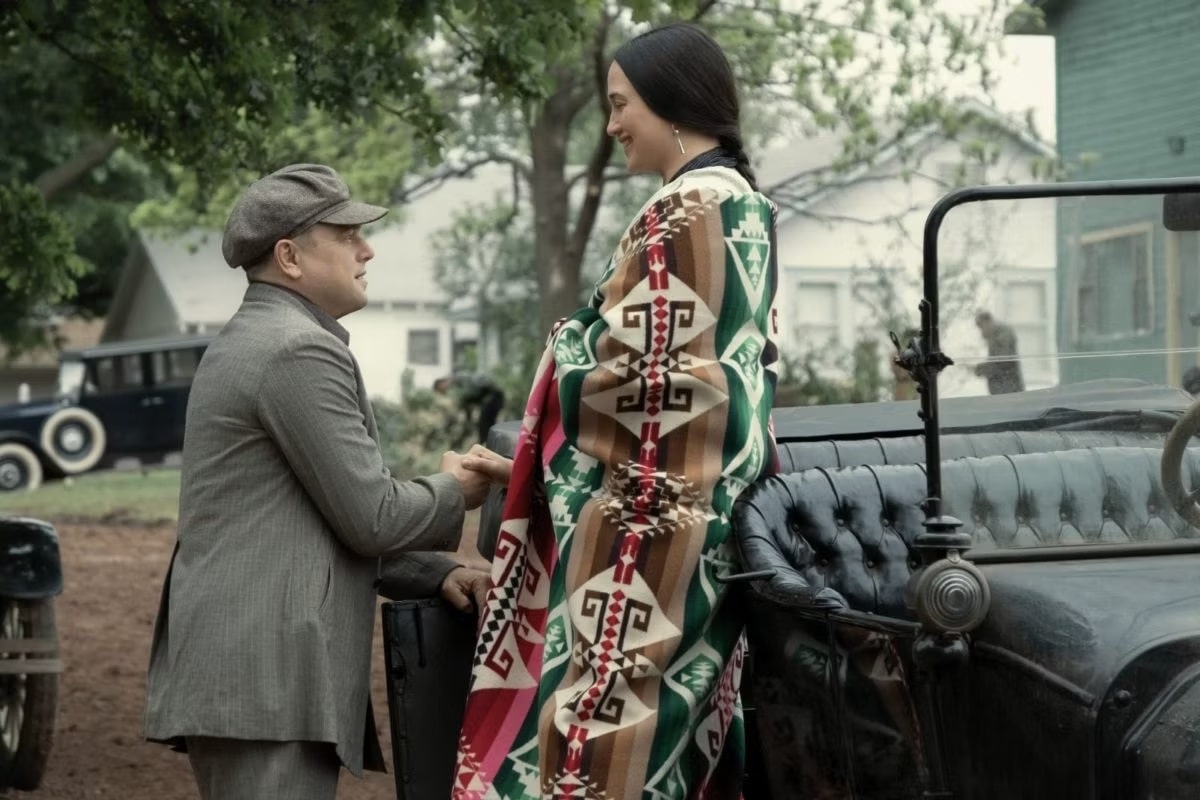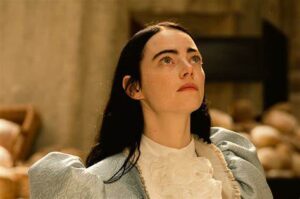
19 Dec ‘Killers of the Flower Moon’ is Going to Win Best Picture
Though it was never intentional, attempting to call the season’s eventual Best Picture winner in December has become a tradition for me. Last year, however, it was a lot easier. Everything Everywhere All at Once was the clear winner throughout the season and it had little real competition. This year, I can see compelling cases for three films: Killers of the Flower Moon, Oppenheimer, and Poor Things. I can envision worlds where all three of these films could eventually win Oscar’s top prize. Of course, only one film can triumph, and I think it will be Martin Scorsese’s Killers of the Flower Moon.
As I’ve mentioned in multiple previous posts, the modern Best Picture winner is one that can both garner broad audience support and be socioculturally relevant. All three films fit these two requirements. All three films have IMDb scores of at least 7.9, Letterboxd scores of at least 4.2, and Metascores of at least 87. ‘Killers’ is about American imperialism and the racism and inequity woven into the fabric of the country’s history. Oppenheimer is an anti-war film that despairs over the nuclear age the world has been thrust into. Poor Things deals with womanhood, femininity, and coming into one’s own individuality despite rigid societal pressures. All relevant messages, though of the three, expect ‘Killers’ and Poor Things to be praised more for their social commentary than Oppenheimer.

‘Oppenheimer’ (Universal)
Oppenheimer does consider the consequences of its titular character’s actions. The physicist’s guilt is the emotional and psychological core of the film. Cillian Murphy’s J. Robert Oppenheimer is a man wracked with immense guilt over the destruction, death, and devastation he had a major hand in causing. The film is critical of the American government and what it did during and after its attacks on Hiroshima and Nagasaki. However, the film has and will be criticized for its lack of Japanese voices. Yes, in the film, when the news of the bomb’s deployment reaches Oppenheimer, we hear the cries of those in the midst of a nuclear attack. But many argue the film fails to “fully grapple with the destructive reality of the attacks on Hiroshima and Nagasaki”. Additionally, by creating this film, intentionally or unintentionally, Nolan has made the man responsible for the creation of the atomic bomb something between a hero and a pop culture phenomenon, which leaves a bad taste in many mouths of those who abhor the human devastation Oppenheimer’s actions wreaked on the world. Yes, Best Picture winners have been controversial, Green Book is one of the most recent examples of this. But unlike Green Book which had major supporters behind it like Octavia Spencer that helped relieve some Academy members’ concerns over it being problematic, Oppenheimer does not have any Japanese voices behind or in front of the camera in a major way.

‘Killers of the Flower Moon’ (Apple TV+)
In contrast to Oppenheimer, Killers of the Flower Moon is a three-hour historical drama from one of the most-acclaimed filmmakers of the 21st century that DOES attempt to directly confront American atrocities. The indigenous people of the United States are at the heart of this film. They’re behind the camera, they’re in front of the camera, and they’re at the very heart of this film. The film ultimately serves as a plea to tell the stories of American history not as riveting sensationalia but as what they are: atrocities against human beings. That, however, doesn’t mean that the film is without controversy. The film has been criticized for centering Leonardo DiCaprio’s Ernest Burkhart as the main focus of the film instead of Lily Gladstone’s Mollie or any of the other members of the Osage Nation who were directly affected by the murders.

‘Poor Things’ (Searchlight)
Essentially, both films have stirred controversy for centering white men with blood on their hands at the core of narratives depicting the United States’ atrocities. If both films get embroiled in controversy, Yorgos Lanthimos’ Poor Things is exactly the kind of offbeat dark horse player that can rise to the top in their stead. However, I doubt that Killers of the Flower Moon will face as much criticism as Oppenheimer will. Like 2019’s Picture winner Green Book, 2018 contender Three Billboards Outside Ebbing, Missouri faced controversy for its story’s redemption of a racist character played by Sam Rockwell. However, unlike Green Book, ‘Billboards’ was not able to tread past its controversy into the sea of victory, in part due to the fact that the film featured predominantly white people in front of and behind the camera. Essentially, I believe Killers of the Flower Moon will have a much easier time staving off controversy than Oppenheimer will, but I think there’s a possibility Oppenheimer might just be too powerful and withstand any and all negative attention.

‘Barbie’ (Warner Bros.)
Barbenheimer will undoubtedly go down as one of the defining cinematic moments of the 2020s. Both Barbie and Oppenheimer are undoubtedly two of this season’s top five Best Picture contenders, both bolstered by their massive box office success. According to Wikipedia, “Barbenheimer boosted box office values to their highest point since 2019…Summer 2023 film releases featured underperformances from franchise films, bucking a 10-year run of the highest-grossing summer movies being sequels.” The success of these films is seen by many in the industry as a triumph of auteur-driven cinema over franchise movie blockbusters. Filmmakers like Francis Ford Coppola and Martin Scorsese have expressed how Barbenheimer makes them hopeful about the future of Hollywood cinema. To many, Barbenheimer is emblematic of the film industry finally bouncing back from the COVID-19 pandemic. This has arguably been the best year for cinema since 2019 and Barbenheimer epitomizes that for many. That narrative will be incredibly beneficial for both Barbie and Oppenheimer and both are poised to receive multiple Oscars and double-digit nominations from the Academy.
But is this narrative enough for Oppenheimer to win Best Picture? Prior to 2015 I think it would’ve been, but now, when the Academy seems to be committed to rewarding films they believe to be “socially relevant”, Oppenheimer needs more. And to clarify my own position, I think it’s a good thing that the Academy of today wants to reward socioculturally relevant films. Whether they end up actually rewarding films that tackle issues with complexity, compellingness, and nuance is definitely up for debate (*cough* Green Book *cough*), but nevertheless, I believe the Academy of recent years has spotlighted films that are deserving of that attention AND shed light on issues that more people should be thinking about.
The bottom line for me is that if you were asked to explain in one sentence what Oppenheimer and Killers of the Flower Moon were about, only one of those explanations would be guaranteed to contain a theme the Academy would consider to be sociopolitically relevant. You can’t talk about Killers of the Flower Moon without mentioning its discourse on American imperialism and atrocities against indigenous people. For many people, Oppenheimer is just the story of the man who made the atomic bomb. That’s the difference, Oppenheimer’s sociopolitical content isn’t as close to the core of the power of the film as it is for Killers of the Flower Moon.
Predicting anything three months ahead is a foolish effort. Anything can happen in the time between now and Oscar night on March 10th. There’s a good possibility that my final predictions won’t have Killers of the Flower Moon winning it all. But at this point in the race, I think it makes sense for Killers of the Flower Moon to be this year’s Best Picture winner. I also think that as a film dealing with a state’s violent occupation of an indigenous people, it is deeply relevant to what’s happening in the world today.
If ‘Killers’ wins Best Picture, expect wins for Lily Gladstone in Best Actress and Eric Roth and Scorsese in Adapted Screenplay. I think that while Scorsese winning Director is a possibility, Nolan should still be able to win that category. Best Actor will go to Cillian Murphy, Supporting Actor to Robert Downey Jr., Supporting Actress to Da’Vine Joy Randolph, Original Screenplay to Past Lives, Cinematography to Oppenheimer, Editing to Oppenheimer, Score to Oppenheimer, and Sound to Oppenheimer. If these predictions come to fruition, Oppenheimer will take seven Oscars without winning Best Picture. While that sounds unlikely, there is precedent for this. 2013’s Gravity won seven Oscars and 2016’s La La Land won six without winning the night’s biggest prize.
In the end, as audiences eagerly await the unfolding of cinematic history on Oscar night, the ultimate victor remains uncertain. The beauty of the Oscars lies in their ability to surprise, challenge, and honor the diverse narratives that captivate audiences worldwide. Only time will reveal which film will etch its place in the annals of cinema as the Best Picture of the year.
